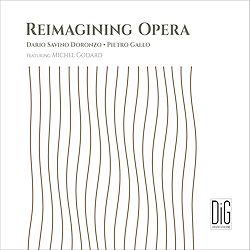 BUY NOW AmazonUK AmazonUS |
DARIO SAVINO DORONZO-PIERTO GALLO-MICHEL GODARD
Reimagining Opera Recorded July 2019, Area Dig
|
Giuseppe VERDI (1813-1901)
Otello "Ouverture" [9:31]
Claudio MONTEVERDI (1567-1643)
Sì dolce è 'l tormento [8:42]
Alessandro PARISOTTI (1853-1913)
Se tu m'ami [6:47]
Giacomo PUCCINI (1858-1924)
Turandot "Nessun dorma" [6:29]
Pietro MASCAGNI (1863-1945)
Cavalleria rusticana "Intermezzo" [5:24]
Tommaso GIORDANI (c 1730-33-1806)
Caro mio ben [7:25]
Giovanni PAISIELLO (1740-1816)
La molinara "Nel cor più non mi sento" [6:00]
Michel GODARD
Fruccia d’ali [4:18]
If this disc is, as the notes aver, a case of ‘honouring the past in order to have a dialogue with the present’ then taking classical repertoire and transmuting it into a jazz context is a by no means unexplored route. Those words are those of the soprano flugelhorn player Dario Savino Doronzo who teams with pianist Pietro Gallo and on three of the eight tracks with Michel Godard, who plays an instrument that cannot ever have been heard on a jazz recording – though there have been a fair few instrumental oddities since 1917 – which is that antique beast, the serpent.
It’s an album of Italian arias from Monteverdi to Mascagni with a strong element of arie antiche. Doronzo plays with tonal warmth and precision and Pietro Gallo supplies fine and diverse support whilst soloing with authority. They play the overture to Verdi’s Otello, one of the few non-vocal inspirations, with attention to detail and bring to the Monteverdi aria that follows a pensive, romantic quality. Michel Godard manages to bring a trombone-like quality to the serpent that both solos here and plays unison with the flugelhorn. I think I can hear an edit along the way as I can at 1:49 in the next track Parisotti’s Se tu m’ami which was for so long attributed to Pergolesi. It’s played relatively straight and then with a greater rhythmic flexibility. Doronzo, as a stylist, occasionally evokes Miles Davis – in his Gil Evans days – rather more than a flugelhorn player proper, such as Clark Terry.
For his solo number, Gallo alludes to Puccini’s evergreen Nessun dorma in his introduction and plays around the theme before embracing lyricism laced with bop inspiration. Dornozo, meanwhile, plays the melody of Mascagni’s Intermezzo quite straight and without sentimentality. He is a mobile technician and here his quick-witted styling really does have something reminiscent of Clark Terry, even down to the tonal richness of his horn. Caro mio ben is another well-known example of arie antiche, and here the flugelhorn and serpent are sufficiently different timbrally. The Paisiello La molinara is youthful, skipping, lyrical and elegant. There’s a bonus track too, the serpent player Michel Godard’s Fruccia d’ali, an ingenious workout for the serpent and flugelhorn without piano.
The arrangements were variously by Doronzo and Gallo with collaborators M Paternoster and G Giannatempo.
There are a few studio noises and some edits, as noted; high end studio noise as well. These are small irritants but there’s a good booklet note from the flugel player and an attractive look to the programme. Whether opera is really reimagined here, I think best to leave to the listener, but it certainly provides strong themes for improvisation. It also supplies that amazing instrumental wild card. Whitney Balliett famously referred to jazz as The Sound of Surprise; here, it’s The Sound of the Serpent.
Jonathan Woolf